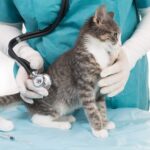The cat and the veterinarian is not always a nice meeting. Recently, I had the chance to meet the coolest cat a veterinarian could see! At no way disturbed by the context of a veterinary examination, it was a nice cat, all cuddly, relaxing, all Mollo, all soft. A real dog that one! But, I asked me, was it a dream?
The veterinary examination is without
No doubt the worst day for many cats.
The cat and the vet all know very well that the majority of minous do not like at all, but not at all, going to the vet! Moreover, some of them become enraged, coarse and monstrous characters once arrived at the clinic! Others anxiety and grow, hoping that we leave them alone.
The annual veterinary examination is undoubtedly the worst day of the year for many cats! But can we do something to diminish the stress and anxiety of kitty that must, despite everything, go to his veterinarian from time to time? Here are five ideas that could make your cat a little more Zen!
1. Avoid hours of affluence from the vet
Let’s say that traffic usually increases the stress of everyone! The more people and animals in the waiting room of the veterinary clinic, the more your cat is likely to anxate. So, when it is possible, make an appointment in the more « quiet » hours of the clinic. The receptionist may surely identify beaches of the schedule where there is less customer.
2. Treat yourself a comfortable carrier
Your cat will undoubtedly be less anxious if it is housed in a spacious and comfortable carrier! Avoid bringing twink in your arms or in a cage too small for him! Make the purchase of a cage large enough so that it can turn easily and go to bed at ease. The cage should also be able to open by separating the top from the bottom of the bottom. Thus, by removing the top of the cage, your cat can stay quietly in « his business » and no one has to root the exclication from his strength cage!
Do not forget to install a good big cover at the bottom of the cage. They are cozy our minous and this little comfort will help to appease the anxiety of the situation.
Thanks to the Journal de Montréal and Annie Ross, docture in veterinary medicine for this part of text.


